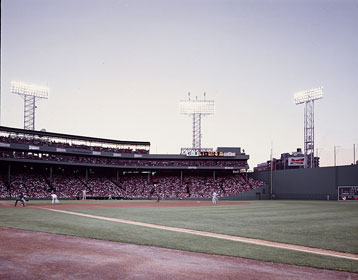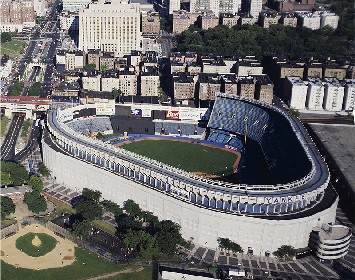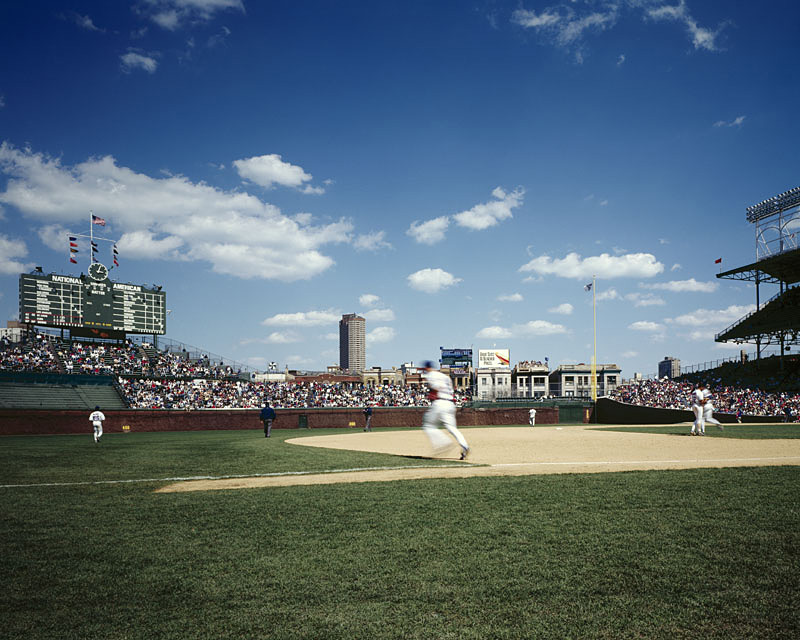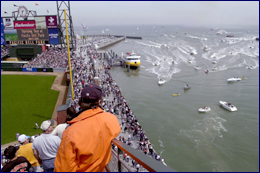Take Me Out to the Ballgame
Updated February 12, 2020 |
Infoplease Staff


Everything you ever wanted to know about Major-League ballparks
by Mike Morrison and Melissa Sogard |
 Fenway Park was built in 1912 by Osborn Archietects & Engineers.  Yankee Stadium was built in 1923 by Osborn Archietects & Engineers.  Wrigley Field was built in 1914 by Zachary Taylor Davis. Related Links |
The Old |
Fenway Park — Boston Red Sox
- The first professional game at Fenway took place on April 20, 1912 (the same week the Titanic sank). Some 27,000 fans watched the Red Sox beat the New York Highlanders (later known as the Yankees) by a score of 7–6 in 11 innings.
- In this day and age, when advertisements are showing up all over parks, it's a rarity to see something that used to have ads and now doesn't. But that's exactly the case with Fenway's Green Monster. The 37-foot-high left-field wall was littered with ads until 1947, when it was painted green.
- The numbers used to indicate runs and hits on the manual scoreboard in left field are 16 x 16 in.
- Amidst all of the green bleacher seats behind the right field bullpens lies one red seat, signifying the spot where Ted Williams's mammoth 502-foot home run landed on June 9, 1946.
Yankee Stadium — New York Yankees
- The stadium is known as "The House That Ruth Built" because it was Babe Ruth's popularity and drawing power that made it necessary for additional seats and gave the team enough cash to build them.
- Several monuments of Yankee greats are located just beyond the fence in left-center field. They were in the field of play until 1976 when the stadium was renovated. Now Monument Park is open to fans before and after games.
- The bleachers in right-center field are known by some as Ruthville and Gehrigville.
- As legend has it, in 1934 Negro Leagues star Josh Gibson became the only player to hit a ball completely out of Yankee Stadium, a gargantuan blast down the left-field line.
Wrigley Field — Chicago Cubs
- Nicknamed "The Friendly Confines," Wrigley is the second-oldest major-league ballpark (1914) behind Boston's Fenway Park.
- Lights were finally added to Wrigley in 1988 and the Cubs' first official night game at Wrigley took place on Aug. 9 of that year with a 6-4 win over the New York Mets.
- The outfield walls are made of red brick and are lined with lush green ivy. If a batted ball gets stuck in the ivy, it is automatically ruled a ground-rule double.
- Television announcer Harry Caray regularly led the crowd in the singing of "Take Me Out to the Ballgame" during the seventh-inning stretch until his death in 1998. Now the honor is bestowed upon various celebrity guests.
Dodger Stadium — Los Angeles Dodgers
- Known as the cleanest park in the majors, Dodger Stadium is repainted every off-season.
- The stadium boasts beautiful views of downtown Los Angeles to the south, and the San Gabriel Mountains off in the distance.
- Dodger Stadium (a.k.a. Chavez Ravine) has kept the same capacity figure since its opening in 1962—56,000.
The New |
Great American Ballpark — Cincinnati Reds
- After sharing Cinergy Field with the NFL's Bengals for almost 30 years, the new home of the Reds, Great American, opened March 31, 2003, when they lost to the Pittsburgh Pirates, 10–1.
- The park features 42,060 red seats on three levels, very little foul territory, a brewpub called The Machine Room, and a firework spouting, misting steamboat-paddle wheel "homerun feature" in right field.
- Fans enter the park through Crosley Terrace. Named for Crosley Field, it contains statues of legendary Reds players Joe Nuxhall, Ernie Lombardi, Ted Kluszewski, and Frank Robinson. Landscaped grass in the terrace is sloped to match the incline of Crosley's outfield and a pitchers mound has been recreated to the same dimensions as the one used at the time. Another tribute is the replica of Crosley's Longines clock located on top of the main scoreboard.
- Ken Griffey, Jr., doubled for the first hit in the park and former President George Bush threw out the opening pitch. Sammy Sosa hit his 500th homerun at the park on April 4, 2003.
- If you can afford them, the eight rows of seats directly behind home plate come with VIP parking, all you can eat and drink, and a lounge that offers a glimpse into the tunnel that the players use to get to the field.
Chase Field — Arizona Diamondbacks
- Chase Field in Phoenix opened on March 31, 1998. Architects eliminated the threat of having fans sit for over three hours in Arizona's hot summer sun by designing a retractable roof over the entire stadium. The roof weighs over nine million pounds and takes just over four minutes to open or close.
- In another effort to cool down its patrons, the ballpark features a 385-square-foot swimming pool in the Sun Pool Pavilion beyond the right-center-field fence, where up to 35 fans can take a dip.
- Unlike any other park in the majors, the infield at Chase has a path of dirt between home plate and the pitchers mound.
 PacBell Park and McCovey Cove are home to the National League's San Francisco Giants and slugger Barry Bonds. |
AT&T Park — San Francisco Giants
- Widely viewed as the most beautiful new park in the league, AT&T Park had its first home opener on April 11, 2000. The Dodgers defeated the Giants 6–5.
- The field measures just 307 ft down the right-field line, which is one reason slugger Barry Bonds broke the all-time single-season home-run record with 73 in 2001.
- The stadium is nestled next to the San Francisco Bay, allowing the opportunity for batters to hit home runs over the right-field fence and into the ocean. The body of water just outside the stadium is known as McCovey Cove, named after former Giants hall-of-fame first baseman Willie McCovey.
- Among the stadium's other attractions are the Coca-Cola Superslide and the 1927 Old-Time Four-Fingered Baseball Glove. Both are located beyond the left-center-field fence, between 450 to 501 ft from home plate. The superslide is actually made up of many slides, including the 56-foot Guzzler. The glove is 26 ft high, 32 ft wide and weighs 20,000 lbs.
Miller Park — Milwaukee Brewers
- The first regular season game occurred on April 6, 2001, with a 5-4 Brewers victory over Cincinnati.
- At Milwaukee's County Stadium (torn down earlier in 2001), each time a Brewers player hit a home run, team mascot Bernie Brewer plunged down a slide into an oversized makeshift mug of beer as balloons were released in the air. Bernie is back with the team at Miller Park, although the mug of beer has given way to the more politically correct, kid-friendly Bernie's Dugout.
- Like the ballpark in Arizona, Miller Park has a retractable roof that can be closed in inclement weather. The fan-shaped roof weighs 12,000 tons and takes approximately 10 minutes to open or close.
- The park features what are known as Uecker Seats in honor of longtime Brewers announcer Bob Uecker. They have an obstructed view of the action and are sold on game day for one dollar.
PNC Park — Pittsburgh Pirates
- Located on the shores of the Allegheny River with the Pittsburgh skyline as a backdrop, the park officially opened with the Pirates' 8-2 loss to Cincinnati on April 9, 2001.
- The outfield wall in right field is 21 ft high, a tribute to former Pirates right fielder Roberto Clemente, who wore number 21. The Pirates also honored their fallen star with the Roberto Clemente Bridge, which serves as a walkway from the downtown area to the park.
- With 38,127 seats, PNC is the second-smallest park in the majors (behind only Fenway Park), giving fans a more intimate feel than some other stadiums.
Minute Maid Park — Houston Astros
- The first regular-season game was played on April 7, 2000, as the Astros lost to the Philadelphia Phillies 4-1.
- The park also makes use of a retractable roof to protect fans from the Texas climate. The roof spans over 6 acres and is designed to open and close in 12 minutes.
- Outside the left-field fence is an 1860s replica locomotive that "heralds the opening of ballpark gates and other special events." Astros Field is connected to Houston's Union Station.
- Minute Maid features the world's largest sliding glass door—a 50,000-square-foot wall of glass (both hurricane and baseball resistant) in left field to give the stadium an outdoor feel even when the roof is closed.
- Tal's Hill is a 20-degree slope in straightaway center field that is a part of the field of play. There is a flagpole located on the incline, three feet from the wall that is also in play. It would take a hefty shot to reach it, however, as straightaway center field measures 436 ft, the longest distance in the majors.
- The stadium was known as Enron Field during its first two seasons, but the name was changed at the start of the 2002 season due to Enron's financial woes. In June 2002, the Astros and The Minute Maid Company signed a long-term partnership and Astros Field became Minute Maid Park.
.com/spot/ballparks2.html
See also:







